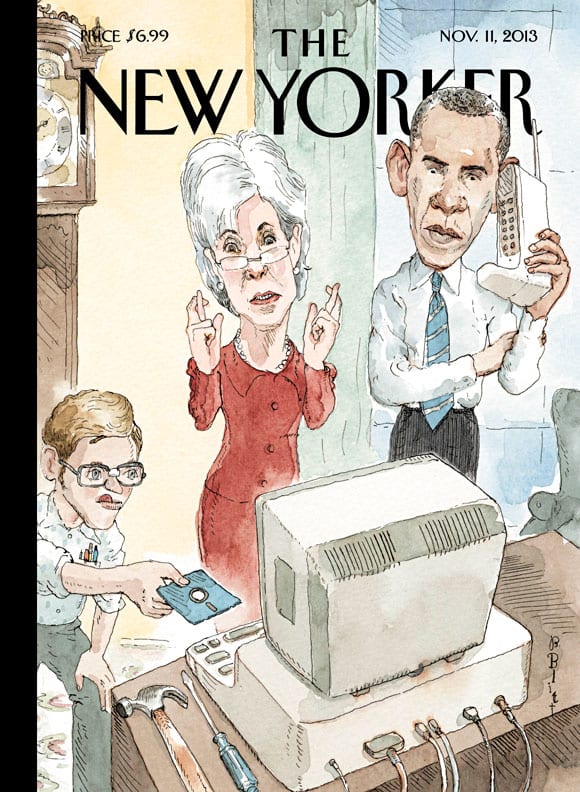UNEXPECTEDLY: America’s Cities Are Running on Software From the ’80s.
The only place in San Francisco still pricing real estate like it’s the 1980s is the city assessor’s office. Its property tax system dates back to the dawn of the floppy disk. City employees appraising the market work with software that runs on a dead programming language and can’t be used with a mouse. Assessors are prone to make mistakes when using the vintage software because it can’t display all the basic information for a given property on one screen. The staffers have to open and exit several menus to input stuff as simple as addresses. To put it mildly, the setup “doesn’t reflect business needs now,” says the city’s assessor, Carmen Chu.
San Francisco rarely conjures images of creaky, decades-old technology*, but that’s what’s running a key swath of its government, as well as those of cities across the U.S.

Shades of the New Yorker cover from 2013, which showed Obama with Gordon Gekko’s brick-sized cell phone and Kathleen Sebelius crossing her fingers while Jay Carney nervously inserted a five-inch floppy disk into the TRS-80-era Obamacare server. Not to mention the speeches that Newt Gingrich was giving during the heady Contract With America days of 1994 and 1995, when he would hold up in one hand a vacuum tube, and in the other a microchip. As he explained, vacuum tubes were still in use in some FAA-regulated Air Traffic Control towers in America.
As Kevin Williamson wrote during the disastrous Obamacare rollout, “We choose not between Marx and Adam Smith but between the DMV and the Apple store:”
I can walk out of the Apple store on Fifth Avenue in New York, which sees more visitors per day than any DMV office, with a couple thousand dollars’ worth of electronics without ever having to stand in line, much less fill out paperwork. When I found myself in need of an unexpectedly large sum of cash while out of the country a couple of years ago, one telephone call to American Express, lasting less than ten minutes, was all it took. Services such as Seamless and OpenTable have greatly simplified all sorts of commercial transactions, and services such as Uber have begun to disrupt longstanding cartels and monopolies on taxi services and other conveniences. Some services even make dealing with the government easier, such as the concealed-carry apps that use GPS to let you know whether you’re legally packing.
And Leviathan is not happy about that.
Fortunately, beginning in 2016, Democratic operatives with bylines advised out of work coalminers to learn to code, before receiving similar advice from former readers in more recent times. Hopefully all of the efforts of these nascent software engineers will eventually begin to pay off to bring urban governmental software into the 1990s.
* Now who’s being naive, Kay? When I lived in Silicon Valley, the numerous power outages were a reminder that the businesses trying to bring you the 21st century were reliant upon a power grid that, thanks to the NIMBY nature of Bay Area leftists, hadn’t been upgraded since the 1960s heyday of Pat Brown, Jerry’s dad.
